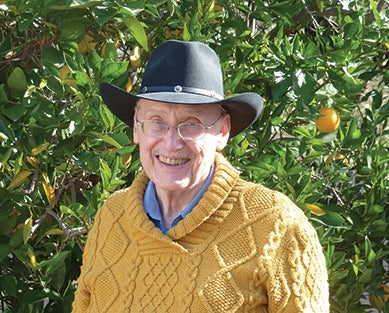 Alvin John Clark PhD ’59 spent more than 30 years researching and teaching bacterial genetics. That path began at the Harvard Graduate School of Arts and Sciences (GSAS), shaped in part by a beloved advisor. In gratitude, Clark has established a bequest intention and gift annuity to create a fellowship for graduate students.
Alvin John Clark PhD ’59 spent more than 30 years researching and teaching bacterial genetics. That path began at the Harvard Graduate School of Arts and Sciences (GSAS), shaped in part by a beloved advisor. In gratitude, Clark has established a bequest intention and gift annuity to create a fellowship for graduate students.
“Harvard is an important place well beyond what I got out of it 50 or so years ago,” says Clark, a retired University of California Berkeley faculty member who now resides in Tucson, Arizona.
After conversations with staff in Harvard’s Office of Gift Planning and his financial advisor, he decided that establishing a gift annuity was a great way to give back to Harvard while simultaneously making a tax-wise retirement decision.
By doing so, Clark receives a secure lifetime income in exchange for a gift that will support Harvard in the future. “I have the benefit of a return on my gift,” says Clark, who also receives an income tax deduction and favorable tax rates on the income he receives.
Through these planned gifts, he hopes to help students find their passions as scientists.
“I want to encourage people to study molecular biology, biochemistry, and neurobiology at Harvard. I want to make it easier for graduate students to explore different areas of research,” he says.
When Clark came to Harvard, he had the opportunity to study biochemistry with Konrad Bloch, Higgins Professor of Biochemistry and eventual Nobel Prize winner.
“By taking Konrad’s course, I fell in love with biochemistry,” he says. Clark was unsure which direction to take, but hoped to study the biology of live animals. When it came time to choose a research advisor, he learned there was a chance to work with Bloch on a project studying insect nutrition.
“Konrad sensed my true purpose in studying biochemistry,” says Clark. “He taught me how to be a good scientist—allowed me to do the things that I thought were important and then gave me the intellectual freedom and rigorous training to pursue them.”
Bloch became an advisor and friend to Clark. “Throughout my thesis research, Konrad was a constant source not just of knowledge, discipline, and inspiration, but also of encouragement,” he says.
To honor his mentor, who passed away in 2000, Clark established the Konrad Emil Bloch Graduate Fellowship in Life Sciences to support future graduate students and to help GSAS remain competitive in attracting students.
“I want Harvard to get really terrific graduate students and that means being able to woo them away from other universities they are tempted to attend,” he says.